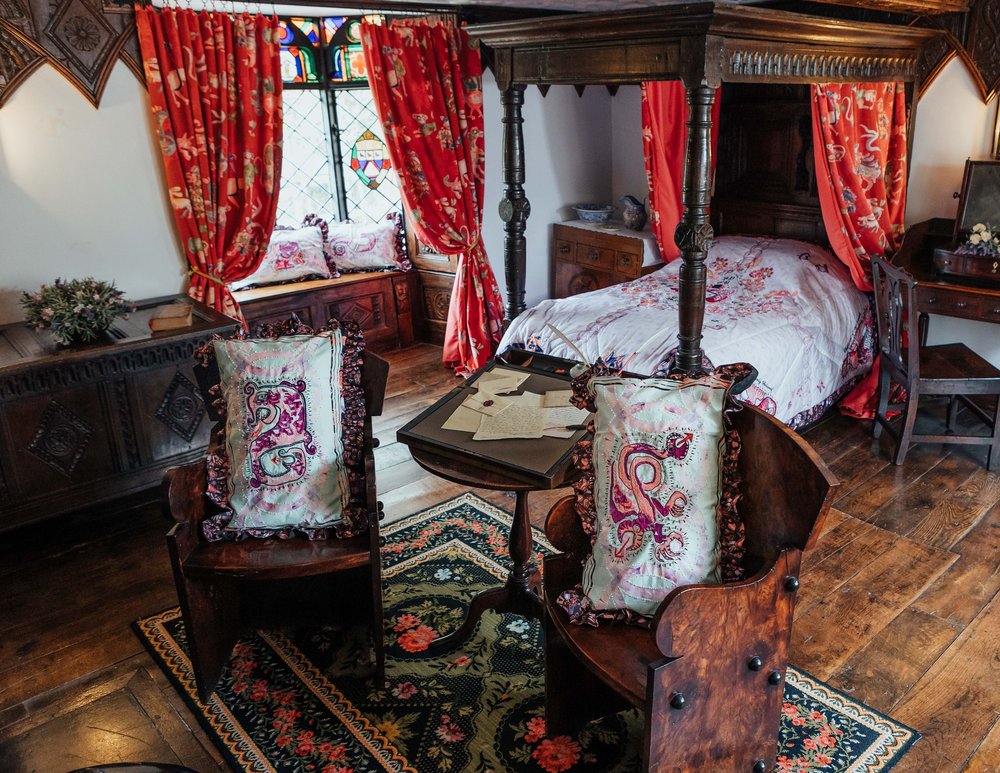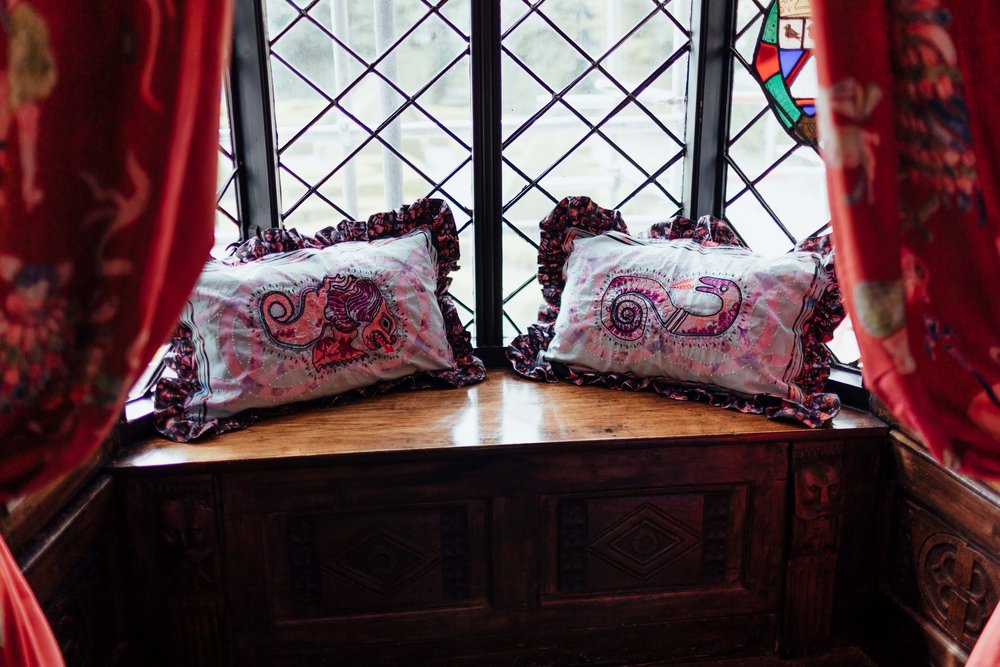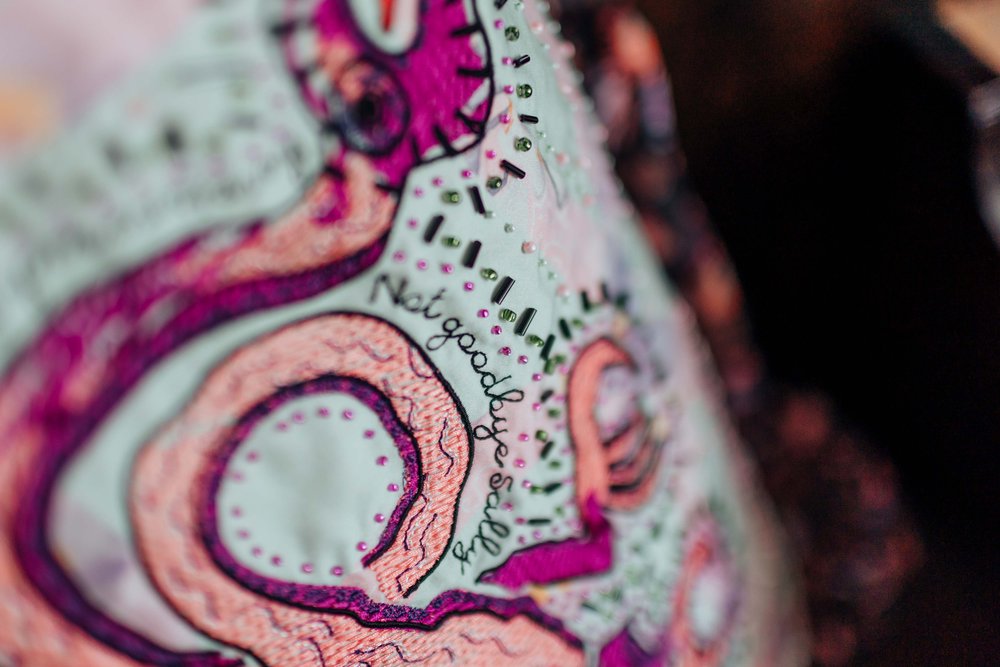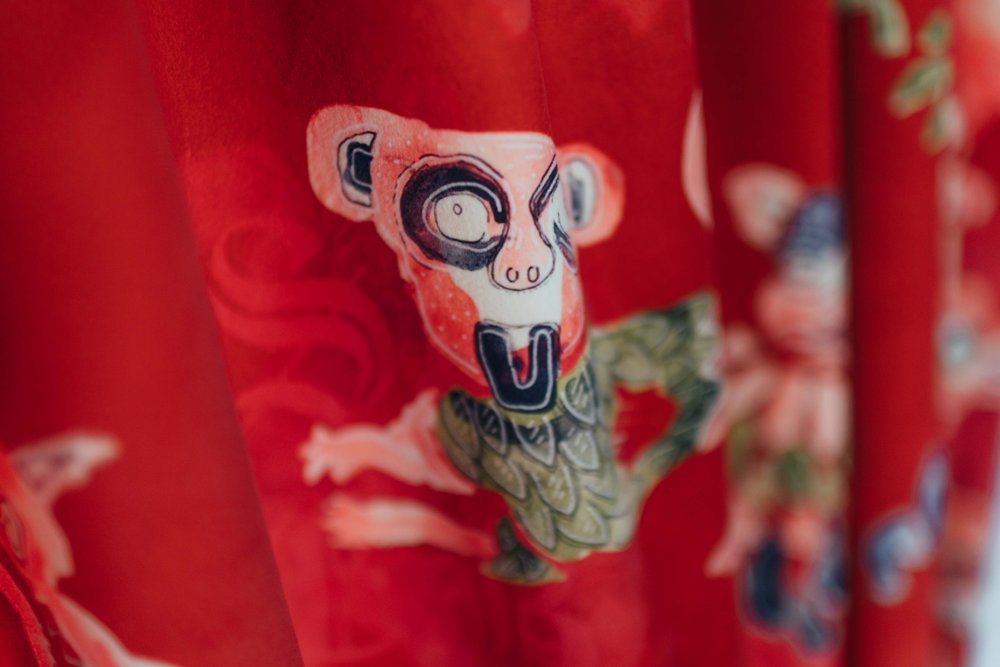Crafting identity at Plas Newydd

The Project
Plas Newydd is a historic house in Wales, managed by Denbighshire Council and open to the public. It was home to Lady Eleanor Butler (1739–1829) and Sarah Ponsonby (1755–1831), who captured the imagination of Regency society when they eloped from their families in Ireland to begin a life together, eventually settling on the outskirts of Llangollen, Wales, in the small cottage they christened Plas Newydd in 1780. They received a stream of visitors, including Shelley, Byron, Wellington and Wordsworth, to the unpretentious little cottage which, over the years, they transformed into a Gothic fantasy of projecting stained glass and elaborately carved oak.
This project aimed to use quilt making as a practice-based research to address the problem of lack of dedicated scholarship on the decorative interventions undertaken by Sarah Ponsonby and Eleanor Butler during their ‘exquisite retirement’ together with Mary Caryl at Plas Newydd.
It has created new knowledge on Sarah Ponsonby’s under-researched embroidery work as a method for crafting identity, social status and gaining financial support. With the sustainability of historic houses as accessible to the public under threat, this project will promote access to heritage, in particular for LGBTQ audiences. New site specific textile artworks will be created resulting in an exhibition and series of public engagement events that will engage new audiences, increase access to heritage and contribute to creating a sense of place.
Research lead
Sarah-Joy Ford, PhD Candidate in Design, Manchester Metropolitan University. Sarah-Joy is an Artist and Associate Lecturer at Manchester School of Art. She works with textiles to explore the complexities and pleasures of queer communities, histories and archives. Her practice sits at intersection of digital and traditional: using strategies of quilting, digital embroidery, digital print, applique and hand embellishment.
The solution
Sarah-Joy’s approach to the project was to undertake an artist residency, with the intention of spending a significant amount of time getting to know the house, the Ladies’ history and the staff who worked there. During this period she had a small studio set up where she was able to sketch and paint in watercolour – just as Sarah Ponsonby had done during her time. As part of the project, Sarah-Joy undertook archival research at The John Rylands library and The National Library of Wales, where some of Sarah’s original sketchbooks are kept. This period of immersion allowed her to create artworks that are intimately site specific, and install an exhibition that was deeply sensitive to the complex historical and decorative narratives of the house.
During the project she also worked closely with Father Lee Taylor who is the vicar of the Llangollen group of churches that includes St Collen’s church, where the three Ladies of Llangollen are buried. This included organising an LGBTQ crafting workshop in the St Collen’s community hall, where mini banners inspired by the Ladies of Llangollen and their importance to LGBTQ history and identitywere created. Sarah-Joy also organised a symposium and exhibition launch which was free to the public and included talks from Professor Alison Oram and Dr Freya Growley and performances from Jane Hoy of Abberation (Queer Tales from Wales).



Outcomes
- Archival Research in Denbighshire Archives, The John Rylands Library & National Archive of Wales: resulted in new research on the importance of Sarah Ponsonby’s creative practices including watercolours, sketching, map making and embroidery. This resulted in the sketches being referenced in the new artworks, an informal report of findings to Plas Newydd curator Carly Davies and bringing her creative endeavours back to the house and a piece of embroidery previously never publicly accessible put on display as part of the exhibition.
- Artist Residency: this period of site-specific production resulted in the creation of new artworks inspired by Sarah-Joy’s time in the house including a bed quilt, cushions, curtains and a series of floor quilts.
- Beloved Exhibition: these artworks were displayed as part of the Beloved exhibition until the end of season on 30th October 2022 which resulted in every visitor to the house being able to see the artworks. The exhibition also included the display of Sarah Ponsonby’s embroidered lampshade cover and a display charting Sarah-Joy’s research journey from books, sketches and textile samples.
- Beloved Symposium: this free to attend day included talks from Professor Alison Oram and Dr Freya Growley and performances from Jane Hoy of Abberation and a presentation from myself about the project research, artworks and outcomes. St Collens church was involved again through an organised historical tour of the church.
- LGBTQ Craft Workshop: run in collaboration with St Collen’s church, the banner making workshop where participants (aged 8-93) created mini banners inspired by the Ladies of Llangollen and their importance to LGBTQ history and identity. I also ran another Ladies of Llangollen themed workshop for Aberrations at the Aberystwyth Arts Center as part of LGBT history month.
- Written Report: written analysis around visitor experience and heritage interpretation at Plas Newydd for the museum.
- Letter of Support: written for St Collen’s church to support their funding bid to secure renovations of the church that would allow the site to be used for more diverse purposes and open up greater access to the historic carvings of the ladies of llangollen in the church’s interior.
Impact
The project benefited Plas Newydd by highlighting the volume, significance and whereabouts of Sarah Ponsonby’s creative practice, and established areas for further research and possible public programming. This could include a longer term plan to exhibit Sarah Ponsonby’s sketch books from the National Library of Wales, in Plas Newydd.
The installation of the Beloved exhibition and accompanying symposium encouraged a diverse range of new audiences to visit Plas Newydd. The exhibition also had an impact on the local community by encouraging those who had not visited the house in a long time, to make a return as there was something new to see in the house.
Sarah-Joy’s project also strengthened the links between Plas Newydd and St Collens church, with the workshop and the tour included in the Symposium drawing the historical connections between the two sites, thus opening up the possibility of further future collaborations. The crafts workshops in particular created an opportunity for communication and LGBTQ allyship between different groups through a celebration of queer history.
It was such a profound experience being able to make work in direct relationship to a historic house that has played such an important role in lesbian history. This project has allowed me to expand and extend the work undertaken through the PhD, establishing a methodology for a professional quilting and artistic practice that is deeply site-specific, enmeshed in archival research and extended through community engagement. This new area for practice-based research has challenged and inspired me whilst re-invigorated my practice. […] Working in collaboration with Denbighshire Council and Plas Newydd has inspired and allowed me to begin developing future projects in the heritage sector. I am now writing up my research findings in a book chapter for the co-edited book ‘Queering Desire: Lesbians, Gender and Subjectivity’ which will be published in 2023, and I am developing further plans to work in collaboration with the heritage sector to use practice-based methodologies to bring more feminist and queer narratives into the sector. Working collaboratively on the placement gave me an entirely new experience as a researcher and has made further work in this area possible.
Sarah-Joy Ford / Research Lead
Media
- See more artworks from this project here:
- Exhibition’s opening and Symposium – poster
- Read more on the exhibition: Beloved pdf
